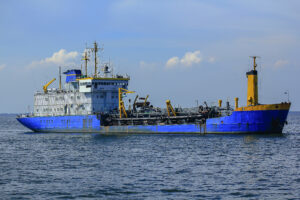The aging infrastructure of inland waterways has been a challenge for the shipping industry for some time. With the passing of the Bipartisan Infrastructure Law, there is plenty of funding available to make needed improvements…but not enough workers to get projects underway. So how can barge operation businesses draw interest in industry jobs? And how can they convince qualified applicants that a career in river transportation is worth pursuing?
Reasons for the Labor Shortage
According to a recent report by Drewry, a leading provider of research for the marine and shipping industry, there is a shortage of 690,000 maritime workers globally. On top of pandemic layoffs and the subsequent Great Resignation, a large generation of older workers has retired as well, and it’s becoming harder and harder to fill their positions for several reasons:
Competing Industries and a Desire for Work-Life Balance
Workers who are interested in trade careers have a variety of options to choose from. Plumbing, HVAC, automotive work—the list goes on and on, and doesn’t require them to leave home for months at a time. And according to the World Economic Forum, 27% of the global workforce will comprise members of Generation Z by 2025. This new generation has a desire for flexible hours and more career avenues available than previous generations, such as online work with social media and other work-from-home positions. At the least, they expect to go home after work to spend time with friends and family.
Lack of Awareness
High school college fairs feature traditional colleges and vocational schools. College career fairs typically include recruiters from companies and businesses with conventional jobs. With no one telling students about job opportunities on waterways, there’s no way for them to know.
Undesirable Working and Living Conditions
Jobs in the barge transportation industry have a reputation for being dangerous. The fear of slips, falls, and other hazards makes some workers hesitant to apply. In addition, potential employees might have the idea that sleeping quarters are tight, and that meals are made and served in a damp, dirty kitchen. Even if these ideas do not reflect the modern reality of working in the industry, they will (unfairly) color the perceptions of younger job seekers.
Lack of Training
Technology in the river transport industry is changing all the time. When employees aren’t constantly trained in new developments, they can’t move into the next role as veteran workers retire. As Mike Ellis, CEO of American Commercial Barge Line, told Workboat, “Our industry has a history of being a cyclical business and one thing that gets cut in a down market is training, and we’ve done a disservice by not training through downtimes. We’ve all learned a lesson that we must continually train. If we try to pay our way out, we’ll just be taking people from other competitors and not fixing the overall issue of how to bring people into the industry.”
Solutions for Drawing Interest to the Barge Transportation Industry
To fill positions, companies must implement new practices to recruit and retain employees.
Network with Schools That Promote Trades
Attending job fairs at high schools and colleges is an excellent way to spread the word. Barge companies may need to hire full time recruiters who can speak with students and clear up misconceptions about the lifestyle on an inland vessel. It also pays to form relationships with maritime organizations such as We Work the Waterways, who are working to foster awareness about the industry by offering events to teach students interested in trades.
Erin Howard, Career Development Program Director with IRPT, a nonprofit that promotes maritime industry jobs in schools, says students must be made aware of careers in this industry.
“Students understand from a young age what it’s like to be a police officer, a lawyer, or a firefighter, but unless they have a family member working in this industry, they probably have not heard about it.”
Some students have interest in becoming an auto mechanic but don’t realize they can work on towboat engines. Hosting hands-on events in which students participate in activities like line-throwing, knot-tying, and PPE safety can introduce students to maritime careers.
It’s also wise to contact the few colleges that offer courses in river transportation, such as Hinds Community College in Vicksburg which offers Deckhand River Barge Training.
Get on Board with Gen Z
It’s not possible to work remotely when working for a barge company, but some strides will need to be made to accommodate the new generation of workers. Candidates should see for themselves that vessels are much more comfortable than they were 20 years ago.
Kyle Buese, president of Campbell Transportation Company in Houston, PA said today’s boats are “very comfortable, very crew oriented. A lot of these boats have a nicer kitchen than in a hotel or a house. You’ve got to make them a place where people want to be.” With Gen Z tuned in constantly to social media, it pays to post Tik Toks and other reels that show what life is actually like on board.
There should also be a focus on promoting a family-friendly culture that recognizes workers have other lives. For instance, Turn Services, which is headquartered in New Orleans and offers cleaning and repair services along the lower Mississippi as well as towing services on the intracoastal Florida-Texas waterway, touts that their team members are “whole people, with families, hobbies, and lives outside of work.” They are also dedicated to developing relationships between employees so they enjoy coming to work.
Explain Growth Opportunities
According to Job Corp, an organization dedicated to helping young people achieve successful careers in the nation’s fastest-growing industries, the average salary for an inland waterway deckhand ranges from $37,440-$75,483. Potential applicants should be told about the chances of advancing in their career rather than just a starting pay scale. Knowing it’s possible to make more money as they become leads and branch out to other positions can be much more enticing.

Offer Referral Bonuses
For years, the industry has relied generationally on families to push the business, and that’s no longer happening. By offering referral bonuses to current employees, barge companies can entice current employees to fill job openings with their contacts.
Adopt the Latest Safety Innovations
Recent inventions focus on improving safety for the marine transport workforce. Sensors that prevent breakaways, remote lid-lifters, laser measuring tools, and safety wedges that prevent overboard workers from being crushed have reduced risks and prevented needless mishaps in recent years. Investing in these advancements can be well worth the money if it brings peace of mind for potential employees.
Beef Up Training Efforts
Employees get bored in stale jobs. If barge companies want workers to stay invested in their careers, they must invest in better training programs. Offering educational resources and professional development opportunities, and carving out clear advancement paths from day one can enhance employee satisfaction and loyalty.
Tout Technology in Interviews
Today’s job candidates expect modern tools, and don’t want to work for a company that is wasteful of their time and energy. They want automated data sharing and invoice generation, advanced digital communication standards, and other enhanced processes that streamline operations. If your business has adopted these innovations or plans to in the near future, be sure to mention them while discussing jobs with applicants.
Integrating BargeOps Software Can Make Barge Companies More Attractive to Job Candidates
Employees are drawn to technology that streamlines operations, reduces manual workload, and creates a more engaging and efficient workplace. By investing in software that automates manual processes and other time-consuming tasks, barge transportation companies can attract candidates who are eager for a lucrative, meaningful career. BargeOps is a leading innovator in barge operations management and would love to help shape the future of your business. Contact us today for a consultation.


